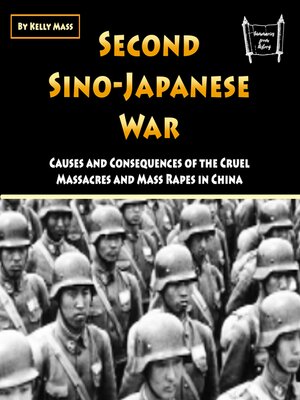Second Sino-Japanese War
audiobook (Unabridged) ∣ Causes and Consequences of the Cruel Massacres and Mass Rapes in China
By Kelly Mass

Sign up to save your library
With an OverDrive account, you can save your favorite libraries for at-a-glance information about availability. Find out more about OverDrive accounts.
Find this title in Libby, the library reading app by OverDrive.



Search for a digital library with this title
Title found at these libraries:
| Library Name | Distance |
|---|---|
| Loading... |
This audiobook is narrated by a digital voice.
The Second Sino-Japanese War, which raged from 1937 to 1945, emerged from the collision between Japan's expanding imperial ambitions and China's desperate struggle to achieve national unity and modernization in the face of internal division and foreign encroachment. The conflict represented far more than a regional war between Asian neighbors; it constituted a fundamental struggle for the future of East Asia that would determine whether China would survive as an independent nation or become a Japanese colony, while simultaneously serving as the opening theater of what would become World War II. The war's origins lay deep in the complex political fragmentation that had characterized China since the fall of the Qing Dynasty in 1911, creating a weak and divided republic that proved incapable of resisting Japanese expansion while providing opportunities for foreign powers to exploit Chinese weakness for their own strategic and economic advantage.
The political chaos that engulfed China during the warlord period from 1916 to 1928 created conditions that made Japanese expansion both possible and seemingly inevitable, as regional military commanders carved up the country into personal fiefdoms while the nominal central government in Beijing exercised little real authority beyond the capital city. This fragmentation reflected deeper problems in Chinese society and politics that included the absence of modern administrative institutions, the weakness of national consciousness among local populations more concerned with survival than abstract political loyalty, and the economic disruption caused by decades of civil war and foreign intervention. The warlords' constant warfare depleted China's resources while preventing the development of modern military forces capable of resisting foreign invasion, creating a vicious cycle of weakness that invited further foreign intervention and internal division.







